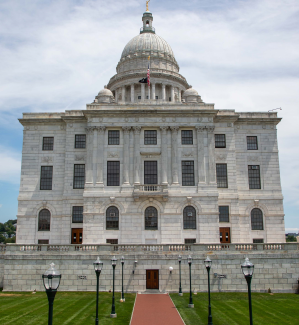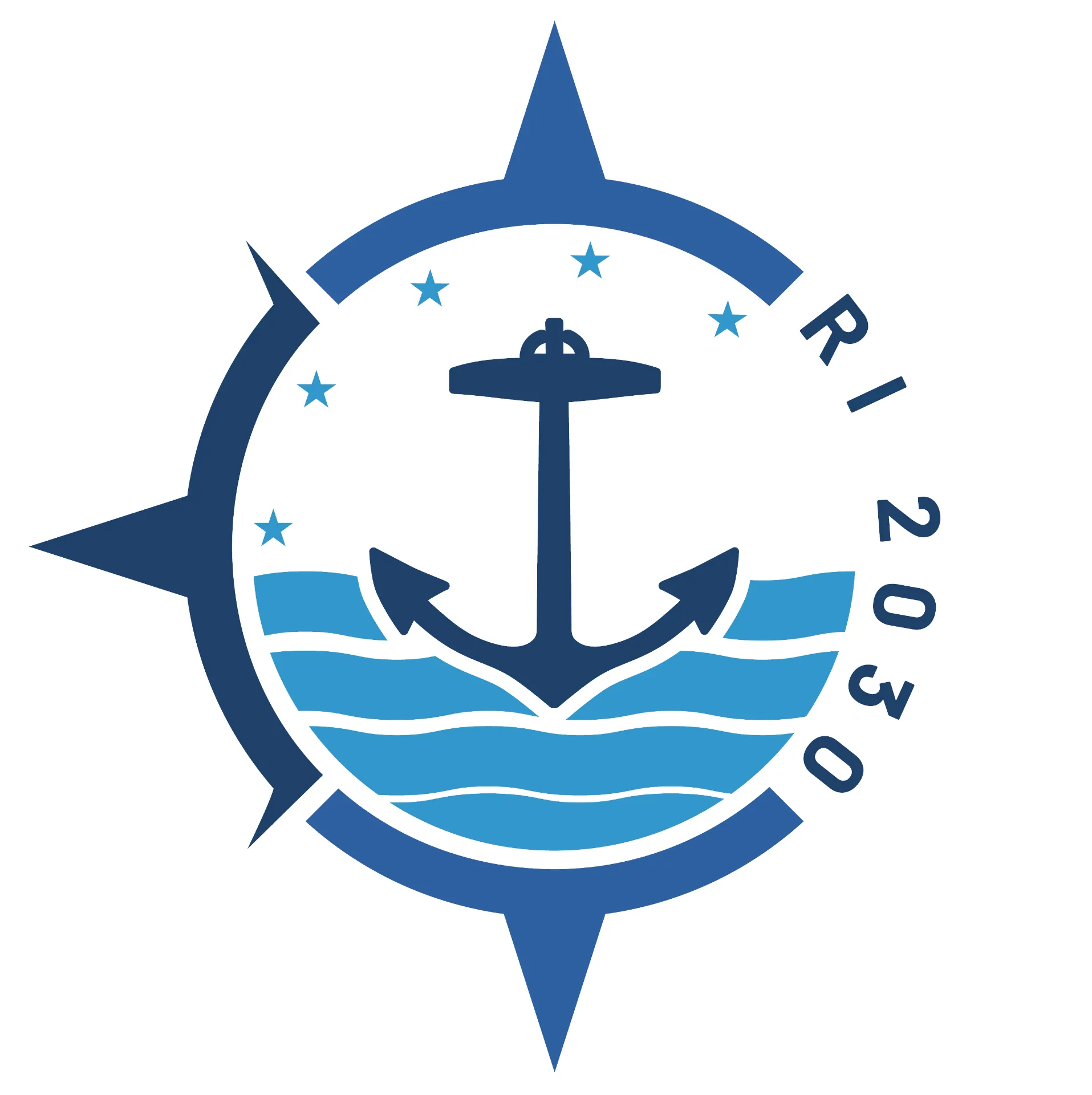Advancing Infrastructure and Energy
Rhode Island is leveraging federal dollars to advance our comprehensive infrastructure goals, a crucial driver of economic growth and productivity. Simultaneously, prioritizing clean energy and addressing climate change are essential to securing a sustainable future for our communities.
Improving Roads and Bridges
- Selected Walsh Construction Company—one of the nation’s top bridge builders—to construct a new, state-of-the-art Washington Bridge that will enhance safety, ease congestion, and support long-term economic growth along the I-195 corridor.
- Secured more than enough funding to fully cover the Washington Bridge rebuild ensuring it will be completed without any additional ask of taxpayers.
- Made RhodeRestore a permanent matching grant program in the FY 2026 budget with ongoing state funding and streamlined access to Rhode Island Infrastructure Bank funds for local matching contributions. The investment of more than $33 million is expected to yield more than $100 million in municipal road improvements.
- Increased the proportion of construction projects in the State Transportation Improvement Plan that include pedestrian infrastructure—such as sidewalks and crosswalks—from 8.2% in 2022 to 16.5% in 2024, enhancing transportation safety for Rhode Islanders.
NEW Strengthening Cybersecurity and Modernizing Technology Infrastructure
- Published the State of Rhode Island Cybersecurity Plan, developed by the state’s Chief Digital Officer in collaboration with a statewide cybersecurity planning group of municipal representatives. The plan outlines a joint effort to improve public sector cybersecurity through targeted SLCGP grant investments focused on: (1) mitigating identified cybersecurity risks; (2) adopting zero trust principles and architecture and (3) promoting a cyber-aware culture across state and local government.
- Administered the State and Local Cybersecurity Grant Program (SLCGP) to fund cybersecurity improvements, with the Governor’s FY 2023 – FY 2026 budgets including matching funds to maximize municipal participation. As of June 2025, over 85 projects have been submitted by participating municipalities, totaling over $9.5 million in cybersecurity improvements, with the State providing over $1.4 million of the funds.

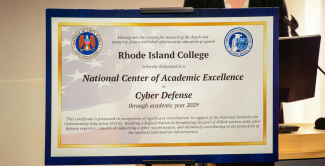
- Established an Artificial Intelligence (AI) Task Force through Executive Order 24-06, convening leaders from higher education, government, small business, healthcare, and industry to develop a roadmap for ethical AI adoption and position Rhode Island as a leader in AI readiness and implementation.
- Launched the implementation of Enterprise Resource Planning (ERP), a fully modern, cloud-based state financial, payroll, and human resources management solution across all State agencies and institutes of higher education—ushering in new levels of transparency, efficiency, and effectiveness in how the state conducts business and manages day-to-day operations.
- Modernized permitting and licensing processes at the DEM through the launch of new digital platforms in 2025, including online systems for boating registration renewals, Agriculture and Pesticide licensing, Freshwater Wetlands, RIPDES Construction General Permit, Water Quality Certification, Underground Injection Control, and OWTS/Septic applications. These rollouts replace decades-old, paper-based systems and mark a foundational shift toward more responsive, user-friendly, and sustainable environmental permitting.
- Invested in Technology Centers of Excellence, including Cloud Hosting, Low Code Applications, Data and AI, and Zero Trust Cybersecurity Architecture, to transform state operations
and drive efficiency through technology.
Expanding Broadband Infrastructure and Digital Equity

Expanded the state’s approach to digital equity by prioritizing inclusive design, accessibility, and clear language on nearly all government webpages operated by DOA’s Enterprise Technology Strategy and Services—exceeding federal requirements and establishing Rhode Island as a national leader in this area.

New Infrastructure Goals
- As part of the “Vision Zero” goal in the Strategic Highway Safety Plan 2023-2027, reduce
all roadway fatalities to zero and decrease fatalities and serious injuries on Rhode Island’s roads by 25% by 2027, advancing the state’s commitment to transportation safety. - Continue modernizing state operations through the digitalization of government services, with a key milestone being the successful implementation and statewide launch of the new cloud-based ERP system.
- In partnership with the Secretary of State’s Office, transform the business registration platform by creating a single, consolidated online system to simplify and streamline business registration processes for Rhode Island businesses.
Advancing Affordable Energy Initiatives and Environmental Resilience
- Signed legislation in 2025 creating the Resilient Rhody Infrastructure Fund, a permanent, dedicated, revolving source of low-interest financing to help municipalities invest in climate-resilient infrastructure projects such as stormwater upgrades, floodproofing, watershed restoration, urban tree planting, and coastal resilience.
- Launched the Ready, Set, Rhody initiative in collaboration with Rhode Island Commerce and the Division of Statewide Planning. This project will develop assessments and remediation plans for Main Street commercial districts in Rhode Island most vulnerable to severe weather, coastal erosion, and flooding. Funded by the state and competitive grants from the U.S. Economic Development Administration, Ready, Set, Rhody aims to enhance community resilience.
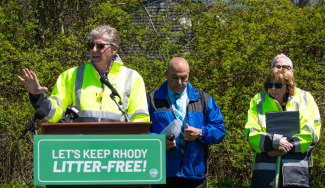
- Continued to support Revolution Wind, which is scheduled to become commercially operational in 2026.
- Reduced rain-related shellfish harvest closures in the Lower Providence River and Greenwich Bay, allowing more days for productive shell fishing. This improvement reflects years of investment in stormwater upgrades, cesspool removals, and sewer expansions—in collaboration with DEM, RIDOH, Coastal Resources Management Council, and local partners—strengthening coastal ecosystems and supporting Rhode Island’s shellfish industry.
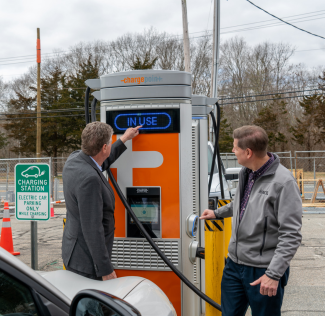
New Energy Goals
- Advance long-term strategies to lower energy costs, alleviating the financial burden on working families and reducing barriers to economic competitiveness by expanding energy supply, investing in infrastructure, and strengthening regional energy partnerships.
- Promote a clean and healthy environment by investing in modern, accessible, and resilient public recreation spaces. In 2025–2026, major infrastructure milestones will include reopening the restored carousel event space at Goddard Park, completing boardwalk reconstruction at Roger Wheeler Beach, new bathrooms and showers at Burlingame, improved entrances and traffic flow at Misquamicut, and breaking ground on a new operations building at Colt State Park.
